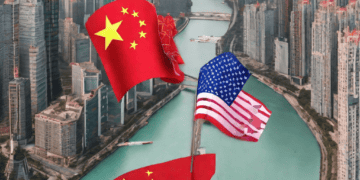Recently, the Chinese government has expressed its concerns regarding the latest executive order signed by President Joe Biden. The order is designed to regulate U.S. investments that support China’s technology sector.
In an official statement released on August 10, the Chinese Foreign Affairs Ministry conveyed its dissatisfaction with the new executive order, stating that it strongly opposes the United States’ evolving investment strategy. The Chinese Embassy in Washington D.C. also weighed in, characterizing the executive order as another effort by the Biden administration to address trade relations between the two countries in a political and confrontational manner, as reported by CNBC.
According to Liu Pengyu, a spokesman for the Chinese Embassy, the new investment restrictions could have a significant impact on both Chinese and American companies and investors. It might hinder normal business collaboration between the two nations and potentially erode international confidence in the U.S. business environment. The spokesman urged President Biden to reconsider these measures, while stressing that Beijing will closely monitor the situation to safeguard China’s economic development interests.
The Chinese Commerce Ministry additionally called upon the United States to respect principles of fair economic competition and to refrain from creating artificial barriers that impede international trade. They expressed concerns that these actions might delay the global economic recovery.
In response, a spokesperson from the Chinese Foreign Affairs Ministry referred to the executive order as “naked economic coercion and technological bullying.” They argued that this approach contradicts market economics and fair competition principles, disrupts the international trade order, jeopardizes the stability of the global industrial supply chain, and has potential implications for the interests of China, the United States, and the global business community.
On August 9, President Joe Biden signed an executive order aimed at regulating U.S. investment and expertise provided to China, Macao, and Hong Kong, particularly in areas like semiconductors, microelectronics, quantum computing, and artificial intelligence. This measure is set to come into effect in 2024.
Catch the latest supply chain news at The Supply Chain Report. Learn more about international trade at ADAMftd.com with free tools.
#ChinaUSRelations #ExecutiveOrder #InvestmentRegulations #TechSector #BidenAdministration #USChinaTrade #EconomicCoercion #GlobalSupplyChain #TechIndustry #InternationalTrade #FairCompetition #GlobalEconomy #ChinaCommerce #GlobalBusiness #Semiconductors #QuantumComputing #AI #BidenExecutiveOrder #USInvestment #ChinaTech
















